Many of those who are about to learn Arabic as a second foreign language have many questions about the goals of the language they want to learn, the study plans that must be followed, and what is the difference between fluent, modern, and classical Arabic, or the language of the Holy Qur’an. eArabicLearning Academy has asked your questions to specialists and experts in teaching The Arabic language is for non-native speakers. Here are the adequate answers to these questions:
1. what should I do if I want to learn Arabic Language in order to understand the Holy Quran?
If you want to learn Arabic in order to understand the Quran, here are a few steps you can take:
Start with the basics: Before diving into the Quran, it’s important to have a solid foundation in the basics of the Arabic language, such as grammar, vocabulary, and sentence structure. Look for resources that focus on teaching these fundamentals.
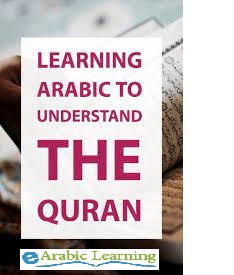
Focus on Quranic Arabic: The Arabic used in the Quran is slightly different from modern spoken Arabic, so it’s important to focus on Quranic vocabulary and grammar when learning the language. Look for resources that specifically focus on teaching Quranic Arabic.
Practice reading and listening: Practice reading and listening to passages from the Quran to improve your comprehension and pronunciation. Look for resources that provide audio recordings of the Quran read by native speakers.
Study with a teacher: A teacher can provide guidance and answer questions as you learn. Look for online teachers who specialize in teaching Quranic Arabic.
Practice memorizing: Memorizing Quran is an important aspect of understanding it. Look for resources that help with memorization techniques and practice reciting verses of the Quran.
Study the translation and tafseer: In addition to studying the Arabic text, it’s important to also study the translation and tafseer (explanation) of the Quran. This will help you understand the meaning and context of the verses you are reading.
Join a Quranic Study group: Joining a Quranic study group can be a great way to connect with other learners and stay motivated. This can be found in your local masjid or online.
Remember, learning a new language, especially Arabic, takes time and consistent effort. Stay motivated and keep at it.
2. How can I learn Quranic Arabic?
Learning Quranic Arabic can be challenging, but there are several resources and techniques that can help you on your journey:
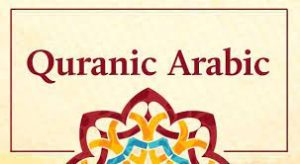
Study the basics of Arabic: Before diving into the Quran, it’s important to have a solid foundation in the basics of the Arabic language, such as grammar, vocabulary, and sentence structure. Look for resources that focus on teaching these fundamentals.
Find Quranic Arabic resources: Look for resources specifically designed to teach Quranic Arabic, such as textbooks, online courses, and apps that focus on Quranic vocabulary and grammar.
Practice reading and listening: Practice reading and listening to passages from the Quran to improve your comprehension and pronunciation. Look for resources that provide audio recordings of the Quran read by native speakers.
Study with a teacher: A teacher can provide guidance and answer questions as you learn. Look for online teachers who specialize in teaching Quranic Arabic.
Memorize verses of the Quran: Memorizing verses of the Quran is an important aspect of understanding it. Look for resources that help with memorization techniques and practice reciting verses of the Quran.
Study the translation and tafseer: In addition to studying the Arabic text, it’s important to also study the translation and tafseer (explanation) of the Quran. This will help you understand the meaning and context of the verses you are reading.
Join a Quranic study group: Joining a Quranic study group can be a great way to connect with other learners and stay motivated. This can be found in your local masjid or online.
Remember, learning a new language, especially Arabic, takes time and consistent effort. Stay motivated and keep at it.
Quranic Arabic and Modern Standard Arabic (MSA) are closely related, but there are some differences between the two.
3. Does Quranic Arabic different than Modern standard Arabic?
Quranic Arabic is the form of Arabic used in the Quran, which was written in the 7th century. It is considered to be a form of Classical Arabic, which was used in literature and formal speech from the 7th century to the present day. Quranic Arabic is characterized by its use of complex grammatical structures and a rich vocabulary.

Modern Standard Arabic (MSA) is the form of Arabic used in formal writing and speech in modern times. It is based on Classical Arabic, but it has undergone some changes and simplifications in grammar and vocabulary over time. MSA is used in news, books, and official documents.
While Quranic Arabic and MSA are closely related, there are some differences in the vocabulary, grammar and style of the two. Quranic Arabic is considered to be more complex and richer in vocabulary, and it uses some words and grammatical structures that are no longer in common use in MSA. However, a good understanding of MSA will greatly benefit in understanding Quranic Arabic.
It is important to note that Quranic Arabic is considered a sacred language and holds a special place in the hearts of Arabic speakers and Muslims worldwide.
4. what is difference between Egyptian Arabic dialect and Modern standard Arabic (MSA) ?
Egyptian Arabic is a dialect of the Arabic language that is widely spoken in Egypt. It is one of the most popular and widely understood dialects in the Arab world. It is used in daily conversation and in media such as TV shows, films, and cartoons.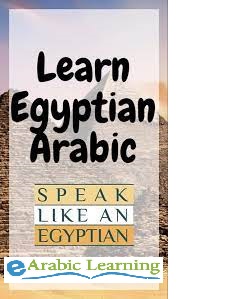
Egyptian Arabic differs from Modern Standard Arabic (MSA), which is the written and formal language used in most of the Arab world, including in books, news, and official documents. MSA is based on classical Arabic and is not typically used in everyday conversation.
For beginners, some key differences between Egyptian Arabic and MSA include pronunciation, vocabulary, and grammar. Egyptian Arabic has a distinctive accent and uses colloquial expressions that are not found in MSA. Additionally, the grammar of Egyptian Arabic is simpler and more flexible compared to MSA, making it easier for beginners to learn and understand.
5. Why does eArabicLearning courses helpful for students who wants to learn Arabic language as a second language?
eArabicLearning online courses can be helpful for students who want to learn Arabic as a second language for a number of reasons:
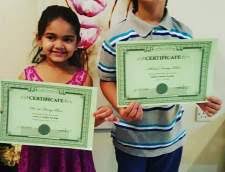
Convenience: Online courses allow students to learn at their own pace and on their own schedule, making it easy to fit language learning into a busy lifestyle.
Personalization: Many online Arabic courses offer the ability to customize your learning experience, such as selecting your level of proficiency, learning style, and specific areas of focus.
Access to native speakers: eArabicLearning course are taught by certified and experienced teachers who are native speakers of Arabic. This can be beneficial for learning the nuances of the language and developing accurate pronunciation.
Variety of learning resources: eArabicLearning courses provide a variety of resources for learning, including audio and video lessons, quizzes, and interactive exercises, which can help keep students engaged and motivated.
Variety of courses: eArabicLearning offers a variety of courses for different levels and purposes, such as business Arabic, Quranic Arabic, and Arabic for travelers, which can help students to focus on their specific needs and goals.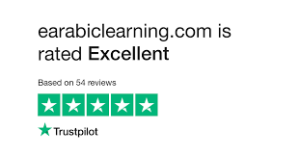
Cost-effective: Online courses are often more cost-effective than traditional in-person classes, which can be particularly beneficial for students on a budget.
Experienced teachers: The platform has a team of experienced and qualified Arabic teachers.
Proven results: eArabicLearning has helped many students improve their Arabic skills and achieve their learning goals.
User-friendly platform: The platform is easy to use and provides a supportive learning environment.
Flexibility: eArabicLearning allows students to learn at their own pace and schedule.
Affordable pricing: The platform offers affordable pricing for its courses and services.
Safe and secure: The platform uses secure technologies to protect students’ personal and financial information.
Positive reviews and recommendations: eArabicLearning has received positive reviews and recommendations from its users. (watch TRUSTPILOT reviews ).
Overall, eArabicLearning online courses can provide a flexible, personalized, and engaging way for students to learn Arabic as a second language.
6. I am totally beginner Arabic student , from where should i start ?
Cultural understanding: Arabic is the official language of over 20 countries and is spoken by more than 420 million people worldwide.
Career opportunities: Knowledge of Arabic can open up job opportunities in fields such as translation, interpretation, diplomacy, and international business.
Access to information: Arabic is the fifth most widely used language on the internet and is the language of many important historical and religious texts.
Personal enrichment: Learning a new language can broaden your perspective and help you better understand different cultures.
Here are some steps to start learning Modern Standard Arabic:
Familiarize yourself with the Arabic alphabet: Start by learning the 28 letters of the Arabic script and their shapes.
Find learning resources: Look for online courses, textbooks, and language exchange programs that can help you improve your Arabic skills.
Immerse yourself in the language: Try to surround yourself with Arabic-speaking people, watch Arabic TV shows and movies, and read Arabic news articles and books.
Practice speaking and writing: Regular speaking and writing practice will help you develop fluency and accuracy in Arabic.
Join a study group or find a tutor: Studying with others can provide motivation and help you stay on track. A tutor can provide personalized feedback and help you with any specific areas where you need improvement.